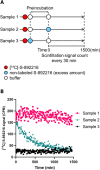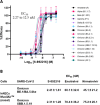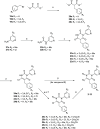Discovery of the Clinical Candidate S-892216: A Second-Generation of SARS-CoV-2 3CL Protease Inhibitor for Treating COVID-19
- PMID: 40616520
- PMCID: PMC12557365
- DOI: 10.1021/acs.jmedchem.5c00754
Discovery of the Clinical Candidate S-892216: A Second-Generation of SARS-CoV-2 3CL Protease Inhibitor for Treating COVID-19
Abstract
The coronavirus disease 2019 (COVID-19) pandemic crisis has been mitigated by worldwide efforts to develop vaccines and therapeutic drugs. However, there remains concern regarding public health and an unmet need for therapeutic options. Herein, we report the discovery of S-892216, a second-generation SARS-CoV-2 3C-like protease (3CLpro) inhibitor, to treat COVID-19. S-892216 is a reversible covalent 3CLpro inhibitor with highly potent antiviral activity and an EC50 value of 2.48 nM against SARS-CoV-2 infected cells. Structure-based design of a covalent modifier for compound 1 revealed that introducing a nitrile warhead increased 3CLpro inhibition activity by 180-fold. Subsequent optimization efforts yielded S-892216, which combined a favorable pharmacokinetic profile and high off-target selectivity. S-892216 exhibited antiviral activity against diverse SARS-CoV-2 variants, including major mutations reducing antiviral activities of nirmatrelvir and ensitrelvir. In SARS-CoV-2-infected mice, S-892216 inhibited viral replication in the lungs similar to ensitrelvir, although at a 30-fold lower dose.
Figures







References
-
- Coronavirus Disease (COVID-19) Epidemiological Updates and Monthly Operational Updates; World Health Organization, 2024. https://www.who.int/emergencies/diseases/novel-coronavirus-2019/situatio... accessed on December 27th 2024.
-
- Mortality in the United StatesProvisional Data, 2023; Centers for Disease Control and Prevention, 2023. https://www.cdc.gov/mmwr/volumes/73/wr/mm7331a1.htm?s_cid=mm7331a1_w accessed on December 27th 2024.
-
- Post COVID-19 Condition; World Health Organization; https://www.who.int/teams/health-care-readiness/post-covid-19-condition accessed on December 27th 2024.
MeSH terms
Substances
LinkOut - more resources
Full Text Sources
Miscellaneous

